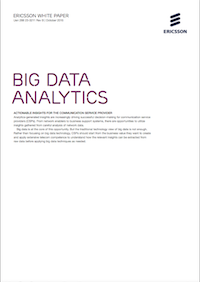
The big-data-driven telecom analytics market alone is expected to have a compound annual growth rate of nearly 50 percent – with annual revenues expected to reach USD 5.4 billion at the end of 2019.
People, devices and networks are constantly generating data. When users stream videos, play the latest game with friends, or make in-app purchases, their activity generates data about their needs and preferences, as well as their QoE. Even when users put their devices in their pockets, the network is generating location and other data that keeps services running and ready to use.
As a result, the rate of mobile network data traffic growth is increasing rapidly. It is estimated that by 2020, the number of smartphone subscriptions will have increased from today’s 2.7 billion to 6.1 billion, and the total amount of mobile traffic generated by smartphones will be five times that of today.
Communication service providers (CSPs) can make use of this big data to drive a wide range of important decisions and activities. These include: designing more competitive offers and packages; recommending the most attractive offers to subscribers during the shopping and ordering process; communicating with subscribers about their usage, spending and purchase options; configuring the network to deliver more reliable services; and monitoring QoE to proactively correct any potential problems. All these activities enable improved user experience, increased customer satisfaction, smarter networks and extended network functionality to facilitate progress into the Networked Society.
The profound impact that increased broadband networking will have on society will also create business opportunities in new areas for CSPs. Improved real-time connectivity and data management enables the creation of tailored data sets, readily available for analysis and machine learning.This enables data-driven efficiency improvements in several business areas – for example, transport, logistics, energy, agriculture and environmental protection. Furthermore, decision- making in business and society will be facilitated by access to insights based on more accurate and up-to-date data.
In the past, CSPs were prevented from benefiting from the value of big data on account of its sheer weight. The volume, velocity and variety – or the three Vs – of big data were simply overwhelming. These data-handling challenges have now largely been met by a variety of easily obtained tools. Distributed databases, complex event-processing frameworks, analytics libraries and so on have been developed in the open-source community and are readily available to CSPs.
All information that you supply is protected by our privacy policy. By submitting your information you agree to our Terms of Use.
* All fields required.



